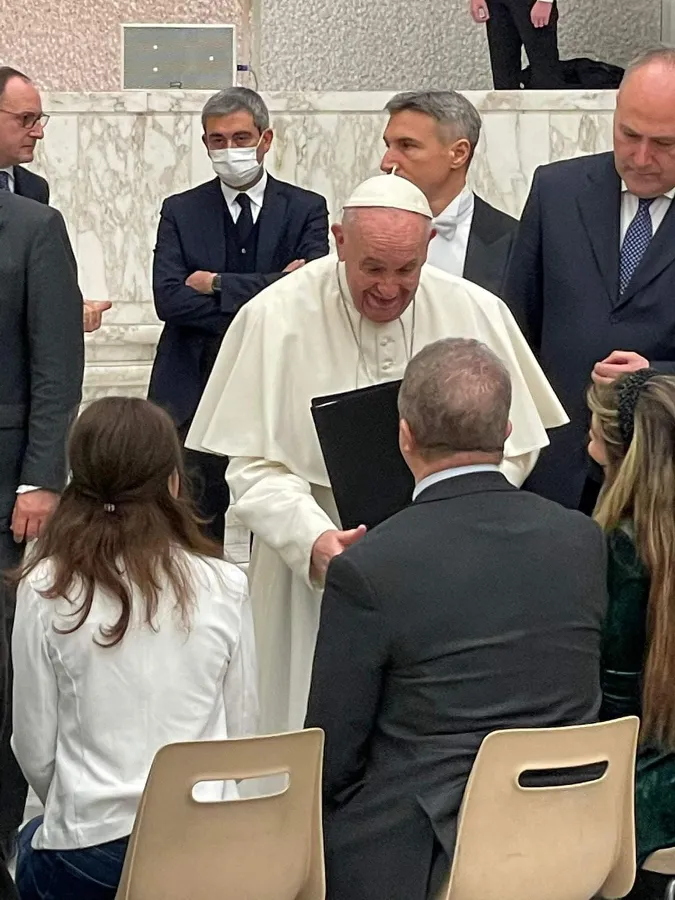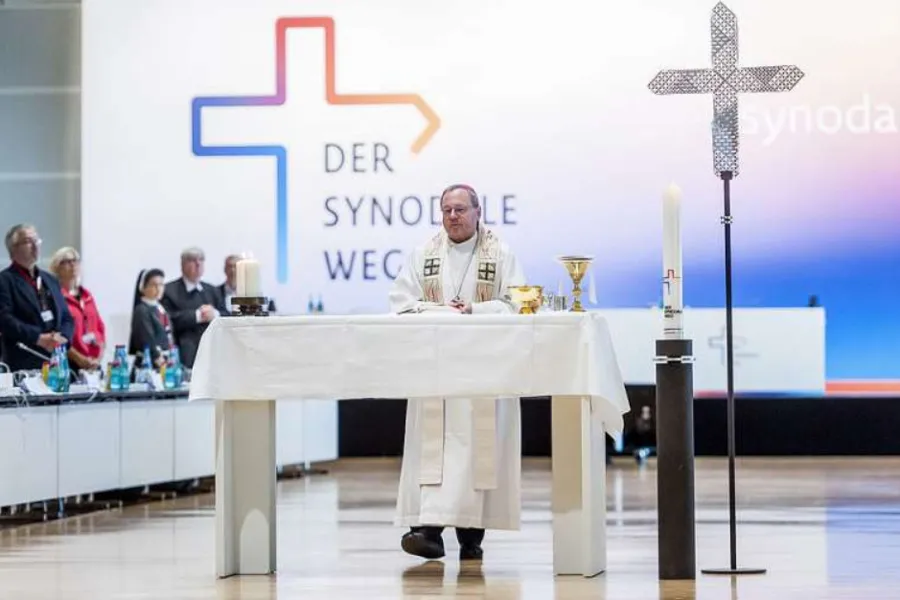
Vatican City, Jan 5, 2022 / 06:00 am (CNA).
Pope Francis on Wednesday received a manifesto, backed by almost 6,000 Catholics, challenging the German “Synodal Way.”
The pope was presented with the document, “New Beginning: A Manifesto for Reform,” after his general audience on Jan. 5.

The manifesto offers a nine-point alternative plan for the Catholic Church in Germany, arguing that the Synodal Way will fail to produce genuine reform, reported CNA Deutsch, CNA’s German-language news partner.
The Synodal Way is a controversial multi-year process bringing together Germany’s bishops and laypeople to discuss the way power is exercised in the Church, sexual morality, the priesthood, and the role of women.
As of Jan. 5, the manifesto, published in 11 languages, has attracted the support of 5,832 signatories from Germany and other European countries.
The document says: “In its fixation on external structure, the Synodal Way misses the heart of the crisis; it violates the peace in congregations, abandons the path of unity with the universal Church, damages the church in the substance of its faith, and paves the way towards schism.”
The text was published on the website of the Arbeitskreis Christliche Anthropologie (Christian Anthropology Working Group), which held a study day last November during which German Cardinal Walter Kasper accused the Synodal Way’s organizers of downplaying the need for evangelization.
In June 2019, Pope Francis sent a 19-page letter to German Catholics urging them to focus on evangelizing in the face of a “growing erosion and deterioration of faith.”
The manifesto, which says that the pope’s letter was “simply ignored” by Synodal Way organizers, was presented to the pope on Wednesday by representatives of the “New Beginning” initiative during a pilgrimage to Rome. A video of the presentation was posted on the initiative’s Facebook page.
The pilgrimage program includes Masses celebrated by Cardinal Kurt Koch, president of the Pontifical Council for Promoting Christian Unity, and Archbishop Georg Gänswein, the personal secretary of Pope emeritus Benedict XVI.
Koch said in 2020 that the pope had expressed concern about the direction of the German Church.
The “New Beginning” manifesto acknowledges the need for “foundational reform” of the Church in Germany, which is facing an exodus of Catholics in the wake of a clerical abuse crisis.
More than 220,000 people formally left the Church in 2020. Only 5.9% of Germany’s Catholics attended Mass that year, compared to 9.1% in 2019.
The manifesto questions the legitimacy of the Synodal Way, pointing out that it does not qualify as a synod in Church law.
“We reject its claim to speak for all Catholics in Germany and to make binding decisions for them,” it says. “The lay people involved in the Synodal Way are representatives of associations, societies, and committees with the addition of arbitrarily consulted third parties.”
“The proposals and claims of this movement, which is legitimized neither by vocation nor representation, testify to a fundamental distrust of the sacramental Church, constituted, as it is, by apostolic authority; their proposals will, once implemented, ultimately effect a committee‐oriented, outward and permanent ‘lay’ redistribution of power and secularization within the Church.”
The text argues that, despite its rhetoric of sweeping change, the Synodal Way is seeking to maintain the “status quo” in the German Church, which receives billions of dollars a year through a Church tax and is the country’s second-biggest employer after the state.
“While the Synodal Way takes up genuine concerns for the church, its strategy remains structurally conservative and evidently uninterested in processes of repentance and spiritual renewal,” it says.
“With regard to the basic social form of the church, representatives of the Synodal Way busy themselves with the preservation of the status quo: they wish to maintain and conserve the model of a highly institutionalized church that is ‘serving its clientele’ through adaptation and modernization.”
The text also claims that the Synodal Way has “instrumentalized” the abuse crisis, ignored Church teaching on the impossibility of ordaining women to the priesthood, and downplayed the importance of marriage.
The German bishops’ conference initially announced that the Synodal Way would end with a series of “binding” votes — raising fears at the Vatican that the resolutions might challenge the Church’s teaching and discipline.
Bishops and theologians have expressed alarm at the process, but German bishops’ conference chairman Bishop Georg Bätzing has vigorously defended it.
The most recent gathering of the Synodal Way took place in Frankfurt, southwestern Germany, on Sept. 30-Oct. 2, 2021.
The event was the second meeting of the Synodal Assembly, the supreme decision-making body of the Synodal Way. The assembly consists of the German bishops, 69 members of the powerful lay Central Committee of German Catholics (ZdK), and representatives of other parts of the German Church.
The meeting ended abruptly following votes in favor of a text endorsing same-sex blessings and a discussion of whether the priesthood is necessary.

The Synodal Way was originally expected to end in October 2021, but was extended to February 2022 due to the pandemic. Organizers announced in the fall that the initiative would be extended again to 2023.
The authors of the “New Beginning” manifesto argue that the Synodal Way overlooks Pope Francis’ appeal in his 2013 apostolic exhortation Evangelii gaudium for all the baptized to recognize that they are “missionary disciples” called to engage in evangelization.
“Only a church that makes spiritual maturity and independence a central goal is able to respond substantially and sustainably to the experience of abuse and cover‐up in all its variants,” the text says.
“We are grateful that Pope Francis has scheduled a world synod at which precisely this topic will be dealt with, and where generally binding resolutions can be made and expected.”
In October, the pope opened the first phase of a two-year global consultative process leading to the Synod of Bishops’ assembly on synodality.
It is currently unclear what impact the global synodal process will have on the German Synodal Way. Bätzing said in May 2020 that the global initiative would be “complemented” by the process in Germany.
Pope Francis addressed fears about the trajectory of the German Synodal Way in an interview with the Spanish radio station COPE aired last September.
Asked if the initiative gave him sleepless nights, the pope recalled that he wrote an extensive letter that expressed “everything I feel about the German synod.”
Responding to the interviewer’s comment that the Church had faced similar challenges in the past, he said: “Yes, but I wouldn’t get too tragic either. There is no ill will in many bishops with whom I spoke.”
“It is a pastoral desire, but one that perhaps does not take into account some things that I explain in the letter that need to be taken into account.”
If you value the news and views Catholic World Report provides, please consider donating to support our efforts. Your contribution will help us continue to make CWR available to all readers worldwide for free, without a subscription. Thank you for your generosity!
Click here for more information on donating to CWR. Click here to sign up for our newsletter.







I want to see a newly-written book be published that bears the title: “McCarrick’s Pope.”
The “Synodal Way” is just an excuse to propagate heresy and modernism by the German Bishops, most of whom have long ago lost their faith in God, and only stay in their positions because of the wealth and privileges it affords them. Instead of lashing out against the Mass of Ages Pope Francis should instead end this scandal by issuing a bull shutting down the “Synodal Way” with immediate effect, under penalty of excommunicaiion.
A camera doesn’t lie, the adage relevant to Chairman Bishop Georg Bätzing offering Mass in public with stole no Chasuble. Many of us, myself included, had similar mind of reverence now in my mind after suffering awareness of its contribution to universal moral irreverence, typical of a Progressivism that distances from Christ as revealed. That revelation fought over, contested, finally concretized in the canons at Trent.
Neuer Anfang is good, better than nothing, though deficient, containing misleading nuance. It speaks of fundamental reform that strikes this writer as heady. Neuer posts two positions that reflect Amoris Laetitia and outlook on Women section 5 and Blessing of irregular unions 7.
5 “We want to ensure that women have the same rights and duties as men at all levels in the Church, including leading positions”. Again heady, as in reeling from overindulgence of progressivism. Equality of men and women in Christianity was never intended to dissolve difference.
7 “Amoris Laetitia refers to situations that are objectively sin, in which humans are overwhelmed. Therefore it is no longer possible to claim that anyone who is in an irregular situation lives in a state of mortal sin and loss of sanctifying grace. They find themselves in a concrete situation that does not allow them to act differently and make different decisions, without charging themselves again with guilt” (Neuer paraphrasing Amoris 301). Neuer Anfang responds that the German Synodal Way exaggerates this concept of mercy, whereas if the signatories agree with what’s quoted in Amoris as legitimate, they de jure admit to the very position of Bätzing and associates on the legitimacy of the contested blessing.
There is in effect too much in Neuer that conforms de jure with the Synodal Way as there is consistent in Vatican policy that signals the direction Georg Weigel’s perceived “dominant voices” says in his article, “No optimism, much hope” would wish to take it.